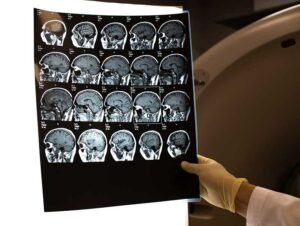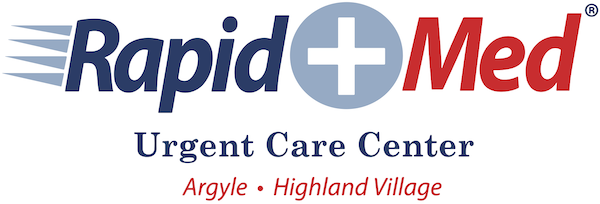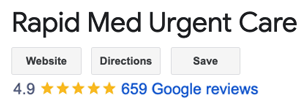Concussions, often referred to as mild traumatic brain injuries (mTBIs), are a common occurrence, particularly in high-impact sports, accidents, and falls. These injuries can have significant implications for an individual’s physical, cognitive, and emotional well-being. At Rapid Med Urgent Care in Highland Village or Argyle, we recognize the importance of providing specialized care for concussions, ensuring thorough evaluation, appropriate treatment, and safe return to activities, including sports.
Causes of Concussion
 Concussions typically occur due to a sudden, forceful impact to the head or body, causing the brain to move rapidly within the skull.
Concussions typically occur due to a sudden, forceful impact to the head or body, causing the brain to move rapidly within the skull.
Common causes of concussions include:
- Sports Injuries: High-impact sports such as football, soccer, hockey, and basketball pose a significant risk of concussions due to collisions, falls, or blows to the head during gameplay.
- Motor Vehicle Accidents: Car accidents, motorcycle accidents, or pedestrian accidents can result in head trauma and concussions due to the sudden deceleration or impact forces involved.
- Falls: Falls, particularly among young children and older adults, are a leading cause of concussions. Falls from heights, slips on icy surfaces, or falls down stairs can lead to head injuries and concussion.
- Physical Assault: Intentional blows, punches, or assaults to the head or body can cause concussions and other traumatic brain injuries.
Symptoms of Concussion: Concussions can manifest with a wide range of symptoms, which may vary depending on the severity of the injury and individual factors. Common symptoms include:
• Headache or pressure in the head
• Dizziness or balance problems
• Nausea or vomiting
• Fatigue or drowsiness
• Confusion or disorientation
• Memory problems or difficulty concentrating
• Sensitivity to light or noise
• Blurred vision or double vision
• Sleep disturbances
• Mood changes, irritability, or emotional lability
It’s crucial to seek immediate medical attention if you suspect a concussion or experience any symptoms of a head injury, as early diagnosis and management are essential for recovery.
Diagnosis of Concussion
Diagnosing a concussion involves a comprehensive evaluation by a healthcare provider, which may include:
- Medical History: A thorough review of the patient’s medical history, including the mechanism of injury, symptoms, and any previous head injuries or concussions.
- Physical Examination: A neurological examination to assess cognitive function, balance, coordination, reflexes, and other neurological signs. Specialized tests such as the SCAT5 (Sport Concussion Assessment Tool) or the SAC (Standardized Assessment of Concussion) may be used to assess cognitive function and symptom severity.
- Imaging Studies: While most concussions do not require imaging tests such as CT scans or MRIs, they may be ordered if there is concern for more severe traumatic brain injury or complications such as intracranial bleeding.
- Symptom Assessment: Evaluation of concussion symptoms, including headache, dizziness, nausea, cognitive difficulties, and emotional changes, to guide treatment and recovery recommendations.
Treatment and Management of Concussion
The management of concussion focuses on symptom relief, cognitive rest, gradual return to activity, and monitoring for complications.
Treatment may include:
- Rest: Physical and cognitive rest, including avoiding activities that exacerbate symptoms, such as screen time, reading, or strenuous exercise. Adequate sleep and relaxation are essential for the brain to recover from concussion.
- Symptom Management: Medications such as acetaminophen or ibuprofen may be recommended for headache relief. Anti-nausea medications may help alleviate nausea or vomiting. It’s essential to avoid medications that may increase the risk of bleeding or impair cognitive function, such as aspirin.
- Cognitive Rehabilitation: Cognitive therapy or neuropsychological testing may be recommended to address cognitive deficits, memory problems, or attention difficulties associated with concussion.
- Gradual Return to Activity: Once symptoms improve, a gradual return to physical activity, school, work, and sports may be initiated under the guidance of a healthcare provider. It’s essential to avoid activities that increase the risk of re-injury or exacerbate symptoms.
- Follow-Up Care: Regular follow-up appointments with a healthcare provider to monitor symptoms, assess recovery progress, and make adjustments to the treatment plan as needed.
At Rapid Med Urgent Care, we understand the unique challenges associated with concussions, particularly in athletes and individuals involved in high-risk activities. That’s why we offer specialized care for concussions, including evaluation, treatment, and safe return-to-play protocols.
Our concussion specialist is trained to assess and manage concussions, providing personalized care tailored to each patient’s needs. Our comprehensive approach to concussion management includes:
- Thorough Evaluation: Our concussion specialist conducts a thorough evaluation, including a review of the patient’s medical history, physical examination, symptom assessment, and cognitive testing as needed.
- Individualized Treatment Plan: Based on the evaluation findings, our concussion specialist develops an individualized treatment plan focused on symptom management, cognitive rehabilitation, and gradual return to activity.
- Return-to-Play Guidelines: For athletes and individuals involved in sports or physical activities, our concussion specialist provides evidence-based return-to-play guidelines to ensure a safe and successful return to sports participation.
- Multidisciplinary Collaboration: Our concussion specialist collaborates closely with other healthcare providers, including primary care physicians, neurologists, and athletic trainers to coordinate care and optimize outcomes for patients with concussions.
- Education and Support: We provide education and support to patients and their families, helping them understand the nature of concussions, recognize potential warning signs, and navigate the recovery process effectively.
By offering specialized care for concussions, Rapid Med Urgent Care aims to ensure timely and appropriate management of these injuries, minimize potential complications, and promote optimal recovery and well-being for our patients. Whether you’re an athlete, a recreational enthusiast, or an individual who has experienced a head injury, you can trust Rapid Med Urgent Care to provide expert concussion care when you need it most.
Don’t wait – if you suspect a concussion or have experienced a head injury, visit Rapid Med Urgent Care for prompt evaluation and treatment. Your health and well-being are our top priorities, and we’re here to help you get back on the path to recovery.
Schedule a visit today and experience the Rapid Med difference!

